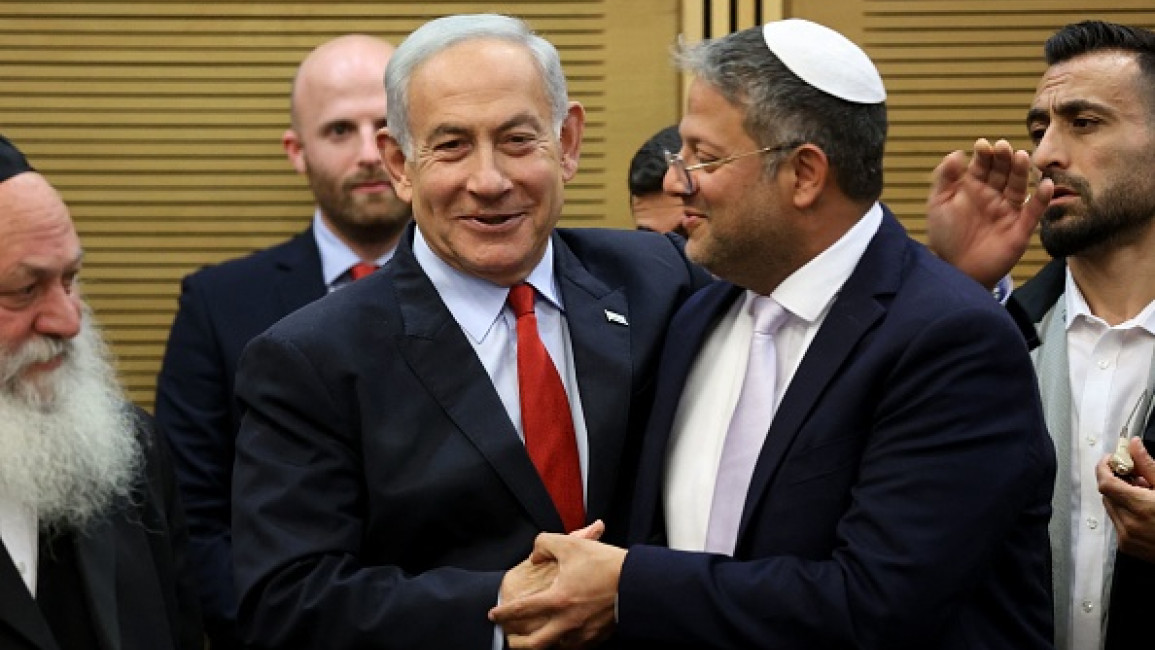Could Netanyahu ditch Israel's far-right and accept Biden's Gaza ceasefire?
Israeli Prime Minister Benjamin Netanyahu’s far-right coalition partners have said they will bring down the government if he accepts the Gaza peace deal presented by Joe Biden.
“[T]he deal.. means the end of the war and the abandonment of the goal to destroy Hamas. This is a reckless deal, which constitutes a victory for terrorism and a security threat to the State of Israel,” the far-right National Security Minister Itamar Ben-Gvir said on X.
He then vowed to “dissolve the government” if the deal is accepted.
Similarly, far-right Finance Minister Bezalel Smotrich told Netanyahu he would “not be part of a government that agrees to the proposed outline and ends the war without destroying Hamas and bringing back all the hostages”.
In his speech on Friday detailing the peace proposal, Biden addressed Netanyahu’s far-right partners and their opposition to peace directly:
“They’ve made it clear: They want to occupy Gaza. They want to keep fighting for years. The hostages are not a priority for them. Well, I urge the leadership in Israel to stand behind this deal despite whatever pressure comes”.
However, though Biden urges Netanyahu to resist the pressure, could the Israeli prime minister accept the deal without Ben-Gvir and Smotrich?
Yair Lapid reaches out
One of the possible scenarios that could play out is that Netanyahu ends the coalition government with Ben-Gvir’s Jewish Power party and Smotrich’s Mafdal-Religious Zionism party.
For this to work, it would mean that Netanyahu would need to come to some sort of agreement with the opposition. This would include Yair Lapid, the centrist leader of Yesh Atid, the Knesset's largest opposition party.
This is something that Lapid seems amenable to.
“I remind Netanyahu that he has our safety net for a hostage deal if Ben Gvir and Smotrich leave the government,” he wrote on X.
“The Israeli government cannot ignore President Biden’s important speech .. there is a deal on the table and it should take it,” he added.
Benny Gantz’s ‘disappointing’ silence
Another key player in ensuring Netanyahu has the sufficient legislative support is Benny Gantz, leader of the National Unity and member of Netanyahu’s special War Cabinet set up after 7 October.
In the wake of the ongoing prosecution of Netanyahu for corruption and his widely unpopular judicial overhaul plans, Gantz has often been labelled a centrist and depicted as a moderate successor to Netanyahu.
Despite Lapid’s party currently having more seats in the Knesset, Gantz is the one who runs Netanayhu most closely at the polls and is seen by some as a favourite of the Biden administration.
However, the White House has allegedly been disappointed by the initial reaction of Gantz when he was presented with the content of Biden’s speech announcing a hostage deal proposal, a US official told the Walla news site.
The domestic factor
This brings us on to the uncomfortable reality that Israeli public opinion continues to be pro-war.
A new Pew Research Center survey found that 39% of Israelis say Israel’s military response in Gaza has been about right, while 34% say it has not gone far enough. Only 19% believe it has gone too far, which means that support for the war remains high among the public.
In the wake of 7 October, Israel’s war on Gaza has been widely popular, which is why Gantz, who had been calling on Netanyahu to resign a few weeks earlier, so readily joined his War Cabinet.
It is most likely why he has not publicly endorsed Biden’s deal, knowing that to do so could lose him public support.
This is also the case for Netanyahu, whose office has said that the deal is a "non-starter" unless it allows Israel to continue its war goal to destroy Hamas, something it has failed to do, while killing over 36,400 Palestinians, most of whom are innocents.
While the focus is on the extremists of Ben-Gvir and Smotrich and their opposition to peace in Gaza and their desire to ethnically cleanse and settle it with Jewish Israelis, Netanyahu’s own base is itself extreme.
The Pew poll also found that 50% of Jewish Israelis believe that Israel should occupy Gaza, while Netanyahu, in a head-to-head with Gantz, would win 36% of the vote compared to Gantz’s 30%, according to a poll by Israel’s Channel 12 news.
Netanyahu’s standing with the Israeli Jewish public has increased since the ICC issued an arrest warrant for him for crimes against humanity in Gaza.
In other words, even without the Ben-Gvir and Smotrich factor, the domestic facto5 could be one that is not supportive of Israel accepting an end to the war in Gaza in the terms set out by Biden.
Netanyahu could find a way to ensure that his governance survives to put in place Biden’s peace deal, but it remains to be seen if he actually wants peace in an environment where war is boosting his power.







 Follow the Middle East's top stories in English at The New Arab on Google News
Follow the Middle East's top stories in English at The New Arab on Google News
![Ben & Jerry's has taken Unilever to court for its alleged attempts to silence it [Getty]](/sites/default/files/styles/image_330x185/public/2024-11/GettyImages-2183900214.jpg?h=199d8c1f&itok=jEcYtQ64)

![The meeting between Musk and Iravani was 'positive', Iranian sources said [Getty]](/sites/default/files/styles/image_330x185/public/2024-11/GettyImages-2184077711.jpg?h=f5c1ac2a&itok=Wb2mIhsF)